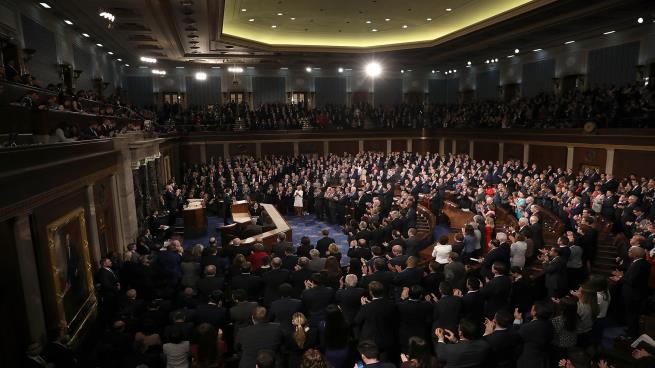The Congress of the United States is about to stop the US support to the Saudi-UAE alliance in the war on Yemen when the Senate votes on a resolution passed by the House of Representatives.
Supporters of halting US support for Saudi Arabia in Yemen expect victory in the coming weeks when the Senate is discussing a resolution by House of Representatives suspending the US military support to Saudi Arabia and the United Arab Emirates in their war in Yemen, The Hill newspaper reported.
It is expected that Trump’s administration increases the pressure as the vote approaches, hoping to convince some Republicans who support this measure to change their mind. Trump’s administration, however, says that there are few tools to stop the resolution, which only requires a simple majority of the procedural vote and the final passage.
Prosecutors said that Trump’s “lukewarm” handling of the murder of Saudi journalist Jamal Khashoggi in the Saudi consulate in Istanbul on October 2 made them attempt to halt support for Riyadh.
“I think we’re going to win,” Sen. Bernie Sanders said. But, he refused to say whether he expects any Republican to support the measure proposed in December to change his vote.
Sanders is expected to vote on the resolution later this month or in early March, while Senator Chris Murphy expects the vote to take place shortly after Congress members return from President’s Day holiday For a week, saying that there are not many reasons to wait.
The draft resolution asks the US president to withdraw US forces or those which adversely affect Yemen, within 30 days, unless they are fighting al-Qaeda or associated forces.
The same resolution was submitted last December to a vote in the Senate and approved by 56 to 41 when the Republicans controlled the majority in Congress.
However, the Democratic Party now controls the House of Representatives, which voted of 248-177 for the resolution last week, which lead to the resolution passed again to the Senate to vote.
If the bill was passed by the Senate vote, Trump’s administration threatens to veto it, arguing that US forces are not directly involved in the fighting in Yemen, and the expansion of the definition of ‘aggressive actions’ can harm other bilateral defense cooperation agreements.
If Trump actually vetoed the draft resolution, it would be the first legislation to be vetoed by the White House since Trump took office in January 2017.
Senate Foreign Relations Committee Chairman Jim Risch, who voted against the decision in December, made no statement about his intention to take any action to prevent the passage of the resolution this time.
“This is going to go through the regular order, and we’ll see how it does,” Risch told The Hill last week.
The Saudi-UAE alliance is involved in horrific war crimes against civilians in Yemen as part of its four-year war against the country and has entered the country into the worst humanitarian crisis in the world, according to the United Nations.



